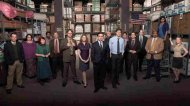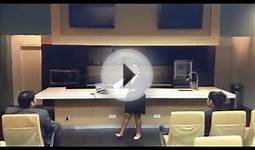Office Training Videos
 The cast of NBC's "The Office". Courtesy of NBC/Universal hide caption
The cast of NBC's "The Office". Courtesy of NBC/Universal hide caption
The Office, a comedy about a jumble of oddball workers trying to get along in a claustrophobic environment, is a phenomenon of our times, a period when the American workforce is more diverse than it has ever been.
But what does the fictional office tell us about the national workplace? After all, not every office has a leader as bumbling and misguided as Michael Scott (Steve Carrell), much less a "Do Not Mock" list or a policy on being "collar blind."
Though the show is clearly a caricature, there are grains of truth in the dysfunctional conflicts that drive its humor, says Sheri Leonardo, senior vice president for human resources at Ogilvy Public Relations.
"As an HR person, I sometimes cringe, " she said. "Some of the stuff is so outlandish, politically incorrect, morally incorrect and everything else — but at the same time I say, 'God, I would love to take clips of this and use it for training, because it's so perfect.' "
A 30-year human resources veteran, Leonardo says that although the characters' insensitivities are exaggerated, she can think of real people who fit many of the show's office stereotypes: the out-of-touch and politically incorrect boss; the peace-keeping secretary; the ambitious underling who doesn't care whose toes he steps on to suck up.
"It's sad, but there are people who do have the insensitivities to others around them ... to what makes people comfortable or uncomfortable, " Leonardo said.
That view is shared by Jean Mavrelis, a diversity consultant and co-author of the book .
"You'd be surprised how many executives are sent to our diversity class to be 'sensitized' so they don't have to be fired, " Mavrelis said in an e-mail.
It's that kind of tension that animates The Office. Every episode depicts employees doing and saying things that, in the real world, might charitably be called ill-advised — but would more likely be seen as fireable offenses.
But if an office environment is too restrictive, Mavrelis says, that tension is often counterproductive.
"The worst climate for learning about diverse others, " she said, "is one in which white males are afraid that someone will call the diversity hot line and end their careers if they make a 'mistake.' "
And in real life, just as on the show, Mavrelis has seen moments that seem to come more from left field than from a prejudice.
You might also like




|
Windows 7 Training Videos - 11 Hours of Windows 7 training by Microsoft Office: Specialist, Expert and Master, and Microsoft Certified Trainer (MCT), Kirt Kershaw Software (DreamForce LLC)
|







